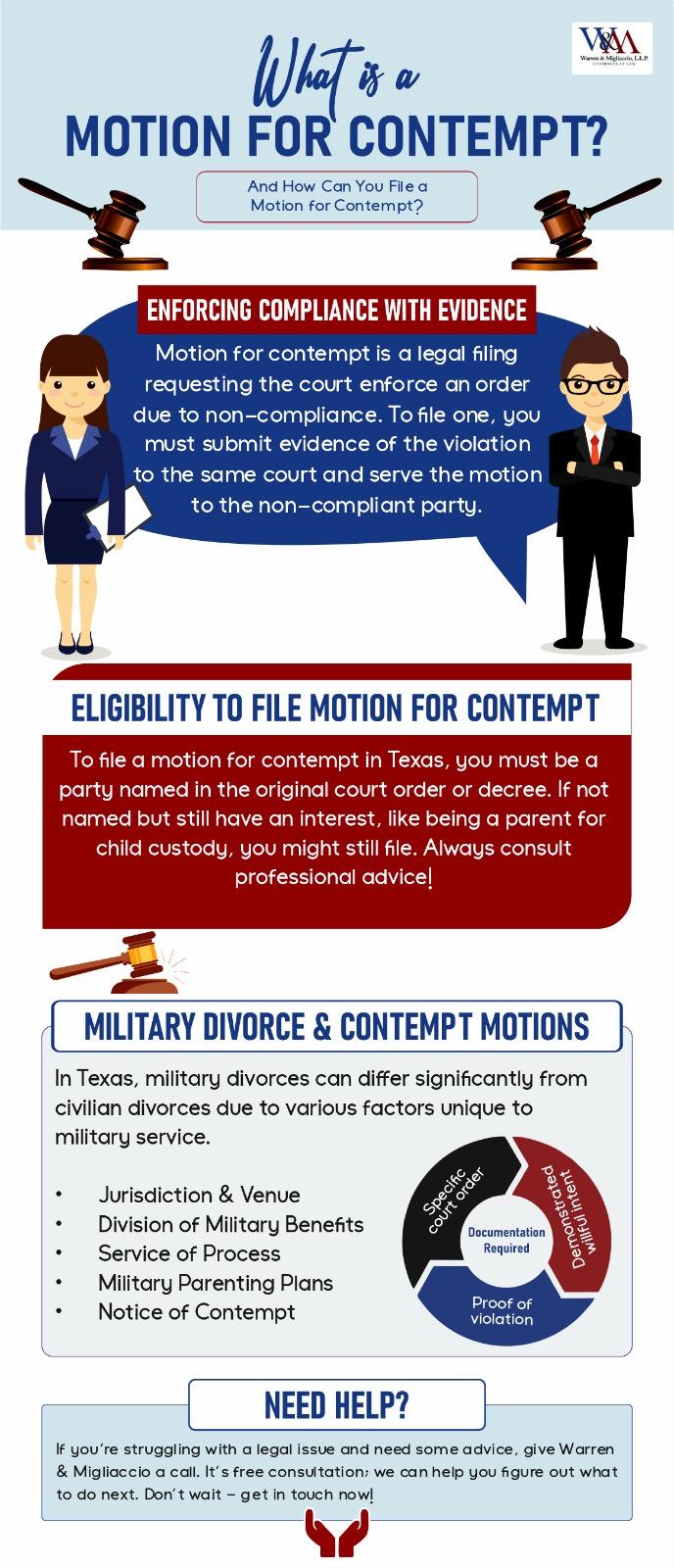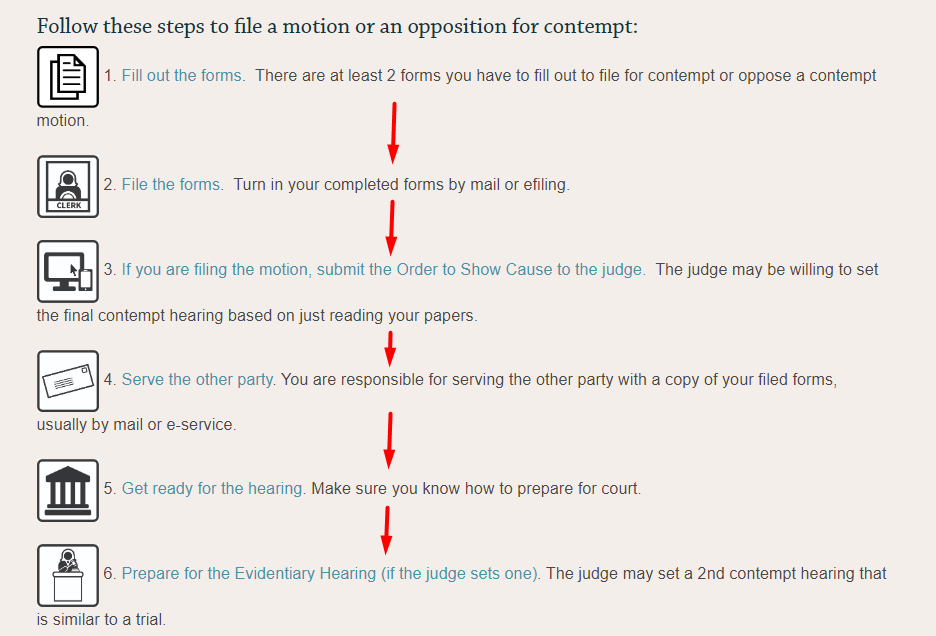A motion for contempt is a legal tool used in Texas family court proceedings to enforce a prior divorce case order or family law decree. It can be filed by either party involved in the case, and it is typically used when one party fails to comply with the terms of the court order. While filing a motion for contempt may seem straightforward, it is essential to understand the steps involved and the consequences that could result from it.
Importance of Understanding the Process
Filing a motion for contempt is not something to be taken lightly. It is crucial to clearly understand the issue and the potential outcomes before deciding to file such a motion. This not only ensures that you are prepared for any possible legal challenges but also helps you avoid unnecessary complications that could arise during the process.

A motion for contempt is a legal document that you file with the court when someone fails to pay child or spousal support, denies visitation rights, or violates other court-mandated obligations. The purpose of a motion for contempt is to request that the court enforce the prior order and hold the non-compliant party accountable.
Consequences of Filing a Motion for Contempt in Family Court
Filing a motion for contempt in family court carries a variety of consequences that one must carefully consider. It can lead to higher legal fees, heightened emotional distress, and potentially strain relationships further, particularly if child custody is involved.
On one hand, if the motion is successful, it can ensure compliance with family court orders, providing a sense of justice and relief. On the other hand, an unsuccessful motion might result in wasted resources and could negatively impact the filer’s credibility in any ongoing or future legal proceedings. Therefore, considering the immediate and long-term implications for all parties involved, it is important to weigh the decision to file such a motion carefully.
Differences between Criminal and Civil Contempt in Texas
In Texas, there are two types of contempt: criminal and civil. Criminal contempt involves willful disobedience of a court order, and the focus is on punishing the guilty party. On the other hand, civil contempt aims to obtain compliance with a court order or compensation for damages caused by non-compliance. Understanding this distinction is essential when filing a motion for contempt to categorize it appropriately.
Legal Implications of Filing a Motion for Contempt
Filing a motion for contempt can have significant legal implications for both parties involved. If the court finds the accused party guilty of contempt, they may face penalties such as fines, jail time, or changes to existing orders. In addition, filing a motion for contempt can also result in straining relationships between the parties.

https://www.familylawselfhelpcenter.org/self-help/divorce/how-do-i-enforce-the-order/214-contempt#
Military Divorce and Contempt Motions
In Texas, military divorces can differ significantly from civilian divorces due to various factors unique to military service. Here’s how a military divorce and filing a notice of contempt may differ from civilian divorce proceedings in Texas:
- Jurisdiction and Venue: Military divorces can involve complex jurisdictional issues because service members often move frequently due to deployments or reassignments. In a military divorce, the spouse may file for divorce in Texas if either the service member or the spouse is stationed in Texas, or it was was the last state of residence for the service member. Civilian divorces typically involve jurisdictional issues based on residency requirements within the state.
- Division of Military Benefits: Military divorces involve the division of military pensions, retirement benefits, and other allowances. The Uniformed Services Former Spouses’ Protection Act (USFSPA) governs the division of military retirement benefits in divorces, allowing state courts to treat military retirement pay as property divisible upon divorce. Civilian divorces may not have such specific regulations regarding the division of military benefits.
- Service of Process: Serving a military member with divorce papers can be more complex than serving a civilian. The Servicemembers Civil Relief Act (SCRA) provides certain legal protections to active-duty service members, including the right to delay court proceedings while on active duty. Special rules and procedures apply for serving divorce papers on active-duty military personnel to ensure compliance with the SCRA.
- Military Parenting Plans: Military divorces may involve unique parenting plans due to the challenges of military service, such as frequent deployments and relocations. Courts may need to consider the best interests of the child while accommodating the military parent’s service obligations. Civilian divorces may not require the same level of consideration for military-related issues in parenting plans.
- Notice of Contempt: Filing a notice of contempt in a military divorce can be complicated if the service member is deployed or stationed away from Texas. The court may need to consider the service member’s military obligations when scheduling hearings or enforcing court orders. The SCRA provides protections for service members facing contempt proceedings, including the right to request a stay of proceedings during active duty.

Potential Outcomes for the Party Filing the Motion
When filing a motion for contempt, there are two possible outcomes. The first is that the court finds the accused party in contempt and imposes penalties or changes to existing orders. The second outcome is that the court dismisses the motion due to lack of evidence or because it was filed incorrectly. It is crucial to have a strong case and proper legal representation to increase the chances of a successful outcome.
Eligibility to File a Motion for Contempt in Texas
To file a motion for contempt in Texas, you must be a party named in the original court order or decree. However, if the court has not named you but you still have an interest in the case, such as being the parent seeking custody of a child involved, you may still file a motion for contempt. It is advisable to seek legal advice in such cases to determine your eligibility and the best course of action.
Types of Contempt that Warrant Filing a Motion
Not all violations of a court order or final decree warrant filing a motion for contempt. Specific conditions must be met before a motion can be filed, such as the violation is willful and not due to circumstances beyond the accused party’s control. Some examples of actions that could warrant a motion for contempt include failure to pay child support, denying parenting time, violating property division orders, or disobeying any other court-ordered obligations.
Proper Serving Methods in Texas
Once you file a motion for contempt, you must serve it on the opposing party in a legally acceptable manner. In Texas, you can do this by personal service, certified mail, or a process server. Proper serving methods are essential to ensure the court recognizes and acknowledges the motion. Twenty-one days must pass before the hearing can be set. The individual held in contempt must receive a Notice of Hearing.
Documentation Required in a Contempt Motion
To prove contempt, three elements are necessary:
- A specific, written court order that has been broken.
- Proof of violation that will show the other party failed to comply. Witnesses often provide valuable information.
- Willful intent to violate a child custody order even though the violator has the means to comply and decides not to. For instance, if the custodial parent chooses not to allow visitation continually, this shows willful intent. Alternatively, the court may deny a contempt motion if the parent fails to bring the child for visitation because of a car problem, such as battery failure.
It is necessary to explain the violation in terms that help the violator comply with the order.
Statute of Limitations for Filing a Motion for Contempt in Texas
Technically, there is no statute of limitation as long as a court order is in effect. If one party fails to comply, a motion for contempt is possible.
Importance of Following Court Procedures Correctly
For the contempt motion to be successful, it must follow court procedures carefully. If this does not occur, the motion will fail.

Respondents’ Rights When Receiving the Motion
The respondent needs to receive the motion promptly. This gives them the right to respond to the accusations. They can then work to disprove the claims and explain why they could not follow the order’s terms.
Judges’ Decisions and Possible Sanctions
This depends on the types of contempt. For instance, civil contempt sanctions such as jail time can end once the problem is fixed. Unlike civil contempt, punishment under Texas Government Code §21.002(a) or (b) is punitive. In this case, the sentence is fixed and definite, and no action by the defendant can change that. It can include a fine of $500 or six months in jail.
How a Family Law Attorney Can Help
Remember, legal action aims not to create more conflict but to resolve existing issues and protect your rights. Approaching legal proceedings with a level head and seeking guidance from experienced professionals is essential. With proper knowledge and preparation, you can navigate the process of filing a motion for contempt effectively and achieve a favorable decision for yourself and your family.

Continue learning about family law and stay informed about your rights to ensure a smooth and fair legal process. The more you know, the better equipped you will be to handle any challenges that may arise in family court proceedings. So keep learning, stay informed, and seek expert legal advice when needed.
Filing a motion for contempt is a serious legal action that should not be taken lightly. Understanding the process, potential consequences and eligibility requirements is vital before filing such a motion.
Proper Legal Advice Is Essential
Proper legal representation can greatly increase the chances of a successful outcome and ensure the protection of your rights throughout the process. So, if you are considering filing a motion for contempt in family court, seeking advice from an experienced family law attorney is crucial to handling the process successfully.
Remember, it is always better to be prepared and well-informed rather than face potential consequences from a poorly thought-out motion for contempt. With the right legal guidance, you can effectively address any violations of court orders and protect your rights in family court proceedings.
Contact Warren & Migliaccio, L.L.P.
Our law firm has helped numerous clients ensure that their divorce and post-marriage child care and spousal support smoothly. However, this does not always happen; we help a spouse or parent use an established method to help ensure it does. One way is to file a motion of contempt, which imposes court-initiated punishment for non-compliance.
Warren and MIgliaccio, L.L.P. works to ensure the contempt motion secures a just resolution. However, we are careful not to inflame what already might be a tense situation. This takes the experience and resources Warren and MIgliaccio have.
When you need to discuss your situation in a free consultation, call us at (888) 584-9614 . We will answer your questions and give you your options moving forward.

